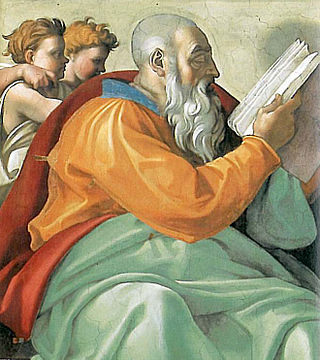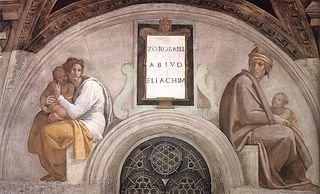Abijah is a Biblical Hebrew unisex name which means "my Father is Yah". The Hebrew form Aviyahu also occurs in the Bible.

Zechariah was a person in the Hebrew Bible traditionally considered the author of the Book of Zechariah, the eleventh of the Twelve Minor Prophets.

There are two biblical characters named Abihud.
Abiram, also spelled Abiron, is the name of two people in the Old Testament.
Ahijah is a name of several biblical individuals:
- Ahijah the Shilonite, the Biblical prophet who divided the Kingdoms of Israel and Judah.
- One of the sons of Bela. In AV (KJV) called "Ahiah."
- One of the five sons of Jerahmeel, who was great-grandson of Judah.
- A Pelonite, one of David's heroes ; called also Eliam.
- A Levite having charge of the sacred treasury in the temple.
- One of Solomon's secretaries.
- Son of Ahitub, Ichabod's brother; the same probably as Ahimelech, who was High Priest at Nob in the reign of Saul and at Shiloh, where the Tabernacle was set up. Some, however, suppose that Ahimelech was the brother of Ahijah, and that they both officiated as high priests, Ahijah at Gibeah or Kirjath-jearim, and Ahimelech at Nob.
- Father of King Baasha of Israel

Ahimelech was an Israelite priest and served as the grand priest of the town of Nob. In the Book of Samuel, he was described as the son of Ahitub and father of Abiathar, but described as the son of Abiathar in 2 Samuel 8:17 and in four places in 1 Chronicles. He descended from Aaron's son Ithamar and the High Priest of Israel Eli. In 1 Chronicles 18:16 his name is Abimelech according to the Masoretic Text, and is probably the same as Ahiah.
Ammihud is the name of several Hebrew Bible figures:
Uzzi is a given name. One derivation is biblical, from Uzzî meaning "my strength". The name can also be transliterated as Uzi. It may be a nickname for Uzza/Uzzah, Uzzia/Uzziah, and Uziel/Uzziel.
Seraiah or Sraya is the name of several people mentioned in the Hebrew Bible, and a name with other non-biblical uses.
Pashur or Pashhur was the name of at least two priests contemporary with the prophet Jeremiah and who are mentioned in the Book of Jeremiah. The name is of Egyptian origin, Pš-Ḥr.
Ophrah, is a name in the Hebrew Bible meaning "a fawn" given to:

Moriah is the name given to a mountainous region in the Book of Genesis, where the binding of Isaac by Abraham is said to have taken place. Jews identify the region mentioned in Genesis and the specific mountain in which the near-sacrifice is said to have occurred with "Mount Moriah", mentioned in the Book of Chronicles as the place where Solomon's Temple is said to have been built, and both these locations are also identified with the current Temple Mount in Jerusalem. The Samaritan Torah, on the other hand, transliterates the place mentioned for the binding of Isaac as Moreh, a name for the region near modern-day Nablus. It is believed by the Samaritans that the near-sacrifice actually took place on Mount Gerizim, near Nablus in the West Bank.

Eber is an ancestor of the Ishmaelites and the Israelites according to the Generations of Noah in the Book of Genesis and the Books of Chronicles.
Joktan was the second of the two sons of Eber mentioned in the Hebrew Bible. He descends from Shem, son of Noah.
Almodad was a descendant of Noah and the first named son of Joktan in Genesis 10:26 and 1 Chronicles 1:20. While the Bible has no further history regarding Almodad, this patriarch is considered to be the founder of an Arabian tribe in "Arabia Felix". This is based on the identification of Joktan's other sons, such as Sheba and Havilah, who are both identified as coming from that region.

Hophni and Phinehas or Phineas were the two sons of Eli. The first book of Samuel describes them as the officiating priests at the sanctuary of Shiloh at the time of Hannah. According to Josephus, Phinehas officiated as high priest because Eli had resigned as high priest at Shiloh because of his advanced age.
Kirjathaim, meaning in Hebrew "town" or "city".
Lebonah was a town near Shiloh, on the north side of Bethel, mentioned in the Hebrew Bible. It has been identified with Al-Lubban ash-Sharqiya, to the south of Nablus.
Meshullam is a biblical masculine name meaning "Befriended".

Ahihud is a moshav in the Western Galilee in northern Israel, about 9 km east of Acre. It was founded in 1950, settled by Jewish refugees from Yemen. It belongs to the Moshavim Movement and falls within the jurisdiction of the Mateh Asher Regional Council. The name of Ahihud is taken from a Biblical verse: "The leader of the tribe of Asher was Ahihud, son of Shlomi".
This page is based on this
Wikipedia article Text is available under the
CC BY-SA 4.0 license; additional terms may apply.
Images, videos and audio are available under their respective licenses.
![]() This article incorporates text from a publication now in the public domain : Easton, Matthew George (1897). "Ahihud". Easton's Bible Dictionary (New and revised ed.). T. Nelson and Sons.
This article incorporates text from a publication now in the public domain : Easton, Matthew George (1897). "Ahihud". Easton's Bible Dictionary (New and revised ed.). T. Nelson and Sons.





